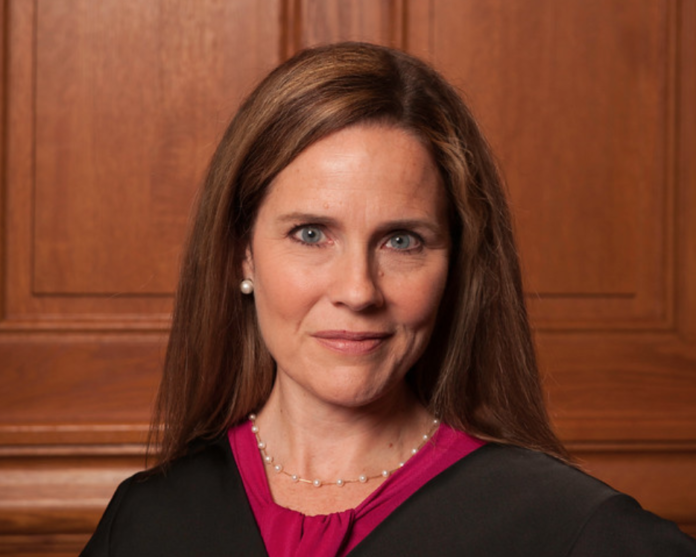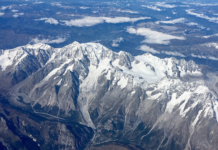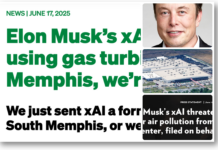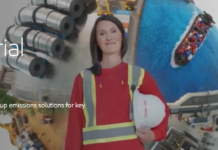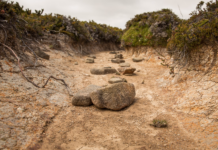«I det øyeblikket hun ble presentert for faktaene i saken, valgte den juridiske autoriteten seg feilaktigheten. Svarene som dommer Coney Barrett gav er rent faktisk unøyaktige, uvitenskapelige og farlige».
Mer enn 70 vitenskapsjournalister har skrevet under på et åpent brev der de advarer om at den nye kandidaten til USAs høyesterett, Amy Coney Barrett, har tette bånd til fossilindustrien. De peker også på at hun offentlig nekter å anerkjenne etablert vitenskap om menneskeskapte klimaendringer, og at dette gjør henne til en «tilrettelegger for den økologiske krisen i vår tid».
Brevet ble først publisert i magasinet Rolling Stone på søndag, og slakter svarene som Barrett gav på grunnleggende spørsmål om klima under høringene i Senatet. Svarene kalles «rent faktisk unøyaktige, uvitenskapelige og farlige».
Som Common Dreams tidligere har rapportert, insisterte den høyreorienterte dommeren på at hun ikke har noe «spesielt syn» på klimakrisen, og – i senere skriftlige svar – kalte forskningen på klimaendringer for «kontroversiell».
– Det er skremmende at en kandidat til Høyesterett – en stilling som dypest sett er en av landets viktigste faktasjekkere – har innlatt seg med den samme propagandaen som vi har jobbet så hardt for å fjerne, heter det i brevet. Det er signert av blant annet klimaforkjemper Naomi Klein, grunnleggeren av 350.org, Bill McKibben, og flere andre prominente klimaskribenter.
«Hvordan kan dommer Coney Barrett gjøre vurderinger i løpende saker som berører klimaendringer, reguleringer, finans, mottiltak, likhet, juss og ansvarlighet – når hun ikke klarer å akseptere selv de grunnleggende premissene for global oppvarming? Svaret er at det kan hun ikke», fortsetter brevet. Det ble publisert bare timer før det republikansk-kontrollerte senatet ryddet av veien et prosedyrerelatert hinder og den endelige avstemmingen for godkjenningen av Barrett kunne finne sted.
Having a justice who is hostile to science on the Supreme Court for decades to come is a supreme threat to the planet in this era of climate emergency.
Proud to sign this letter.https://t.co/yiZEKxlBOM
— Eric Holthaus (@EricHolthaus) October 25, 2020
Her er brevet i sin helhet, på originalspråket, og med alle signaturer nederst:
«We are science and climate journalists. We are researchers and weavers of information, creating a fabric that explains the work of scientists who themselves are working to describe our natural world and universe. We are published in the nation’s leading outlets, both large and small, including Scientific American, Nature, National Geographic, MIT Technology Review, The New York Times, The Wall Street Journal, The Guardian, The Washington Post, The New Yorker and many more. Over decades of reporting on the threats and now deadly and devastating harms of worsening climate change, we have succeeded in at least one respect. The vast majority of the world’s people, including those in the United States, not only acknowledge the scientific certainty of climate change, but also want action taken to address it.
We have succeeded because the science is clear, despite there being a massive well-orchestrated effort of propaganda, lies, and denial by the world’s largest fossil fuel corporations, including ExxonMobil and Koch Industries and fossil-fuel-backed institutes and think tanks. It is frightening that a Supreme Court nominee—a position that is in essence one of the highest fact-checkers in the land—has bought into the same propaganda we have worked so hard to dispel.
And it is facts—a word under repeated assault by the Trump administration, which nominated Judge Amy Coney Barrett—that are at issue here. «I’m certainly not a scientist…I’ve read things about climate change. I would not say I have firm views on it,» Judge Coney Barrett told Sen. John Kennedy during the Senate confirmation hearings on October 13th.
The next day, Sen. Richard Blumenthal asked Judge Coney Barrett if she believed «human beings cause global warming.» She replied: «I don’t think I am competent to opine on what causes global warming or not. I don’t think that my views on global warming or climate change are relevant to the job I would do as a judge.»
When asked that same day by Sen. Kamala Harris if she accepts that «COVID-19 is infectious,» Coney Barrett said yes. When asked if «smoking causes cancer,» Coney Barrett said yes. But when asked if «climate change is happening, and is threatening the air we breathe and the water we drink,» Judge Coney Barrett said that while the previous topics are «completely uncontroversial,» climate change is instead, «a very contentious matter of public debate.» She continued: «I will not express a view on a matter of public policy, especially one that is politically controversial because that’s inconsistent with the judicial role, as I have explained.»
Judge Coney Barrett repeatedly refused to acknowledge the scientific certainty of climate change. This is an untenable position, particularly when the world’s leading climate scholars warned in 2018 that we have just 12 years to act to bring down global average temperature rise and avert the most dire predictions of the climate crisis.
At the moment when the facts of the case were presented to her, this arbiter of justice freely chose to side with mistruths. Judge Coney Barrett’s responses are factually inaccurate, scientifically unsound, and dangerous.
How can Judge Coney Barrett rule on pending issues of climate change liability, regulation, finance, mitigation, equity, justice, and accountability if she fails to accept even the underlying premise of global warming? The answer is that she cannot.
Judge Coney Barrett’s ties to the fossil fuel industry have already proved problematic, forcing recusal from cases involving Shell Oil entities related to her father’s work as a long-time attorney for the company. She may also need to recuse herself from future cases due to her father’s former position as chairman of the Subcommittee on Exploration and Production Law of the American Petroleum Institute—the nation’s leading fossil fuel lobby.
Climate change is already an increasingly dominant aspect of American life, and an issue of growing import in American law. On the Supreme Court docket is BP P.L.C v. Mayor and City Council of Baltimore—a case that involves Shell, Chevron, ExxonMobil, and other major oil companies, and could impact about a dozen U.S. states and localities suing Big Oil over its contribution to climate change.
Judge Coney Barrett says, «I’m certainly not a scientist,» but she does not need to be a scientist, rather she needs to have faith in science. Pope Francis, the head of the Roman Catholic Church, is an ardent supporter of action on climate change, releasing in 2015 the «Encyclical on Climate Change & Inequality: On Care for Our Common Home.» The Pope embraces hard science in order to keep close to his faith.
Judge Coney Barrett has displayed a profound inability to understand the ecological crisis of our times, and in so doing she enables it.»
Signed,
Bill McKibben, journalist and author, the Schumann Distinguished Scholar in environmental studies at Middlebury College
Rebecca Solnit, author and journalist
Sonia Shah, science journalist and author
Jonathan Weiner, Pulitzer Prize winning author, science journalist, and professor at Columbia Journalism School
Jeff Goodell, climate journalist and author of The Water Will Come
Naomi Klein, journalist and author
Michelle Nijhuis, science journalist and author
Amy Westervelt, climate journalist
Rachel Ramirez, environmental justice reporter
Iris Crawford, climate justice journalist
Anoa Changa,movement and environmental justice journalist
Tiên Nguyễn,multimedia science journalist
Eric Holthaus, meteorologist, climate journalist at The Phoenix
Jenni Monet (Laguna Pueblo), climate affairs journalist and founder of Indigenously
Nina Lakhani, environmental justice reporter
Samir S. Patel, science journalist and editor
Clinton Parks, freelance science writer
Meehan Crist, writer in residence in biological sciences, Columbia University
Elizabeth Rush, science writer, author of Rising: Dispatches from the New American Shore
Anne McClintock, climate journalist, photographer and author, professor of environmental humanities and writing at Princeton University
Ruth Hopkins (Oceti Sakowin, Sisseton Wahpeton Oyate), tribal attorney, Indigenous journalist
Wade Roush, science and technology journalist and author
Kim Stanley Robinson, New York Times bestselling author of climate science fiction, Hugo, Nebula, and Locus Awards
Jason Mark,editor in chief, Sierra
Kate Aronoff, climate journalist
Richard Louv, journalist and author
Heather Smith, science journalist
Judith Lewis Mernit, California climate editor, Capital & Main
Madeline Ostrander, climate journalist
Julie Dermansky, multimedia environmental and social justice journalist
Kenneth Brower, environmental journalist and author
Alexander Zaitchik, science and political journalist and author
Hillary M. Rosner, science journalist and scholar in residence, University of Colorado
Wudan Yan, science journalist
Debra Atlas, environmental journalist and author
Rucha Chitnis, climate, environmental justice and human rights documentarian
Drew Costley, environmental justice reporter
Jonathan Thompson, environmental author and journalist
Carol Clouse, environmental journalist
Brian Kahn, climate journalist
Geoff Dembicki, climate journalist and author
Peter Fairley, energy and environment journalist
Nicholas Cunningham, energy reporter
Nina Berman, documentary photographer focusing on issues of climate and the environment, professor of journalism at Columbia University
Michele C. Hollow, freelance journalist
Ben Depp, documentary photographer, focusing on issues of climate and the environment
Virginia Hanusik, climate photographer
Philip Yam,science journalist and author
Maura R. O’Connor, science journalist and author
Chad J. Reich, audio and visual journalist covering energy and environment in rural communities
Steve Ross, environmental writer/editor, former Columbia environmental reporting professor
Starre Vartan, science journalist
Michael Snyder,climate photographer
Brandon Keim, science and nature journalist
Tom Athanasiou, climate equity writer and researcher
Hope Marcus, climate writer
Jocelyn C. Zuckerman, freelance journalist
Dana Drugmand, climate journalist
Tom Molanphy, climate journalist
Roxanne Szal, associate digital editor, Ms. Magazine
Dashka Slater, author and climate reporter
Jenn Emerling, documentary photographer, focusing on issues of climate and culture in the American West
Christine Heinrichs, science writer and author
Clayton Aldern, climate and environmental journalist
Karen Savage,climate journalist
Charlotte Dennett, author, investigative journalist, attorney
Carly Berlin, environmental reporter
Ben Ehrenreich, author and journalist
Ibby Caputo, science journalist
Lawrence Weschler, former New Yorker staff writer, environmental author, most recently with David Opdyke, of This Land: An Epic Postcard Mural on the Future of a Country in Ecological Peril.
Justin Nobel, science journalist
Antonia Juhasz, climate and energy journalist and author
Denne artikkelen ble først publisert av Common Dreams, under Creative Commons Attribution-Share Alike 3.0 License.



